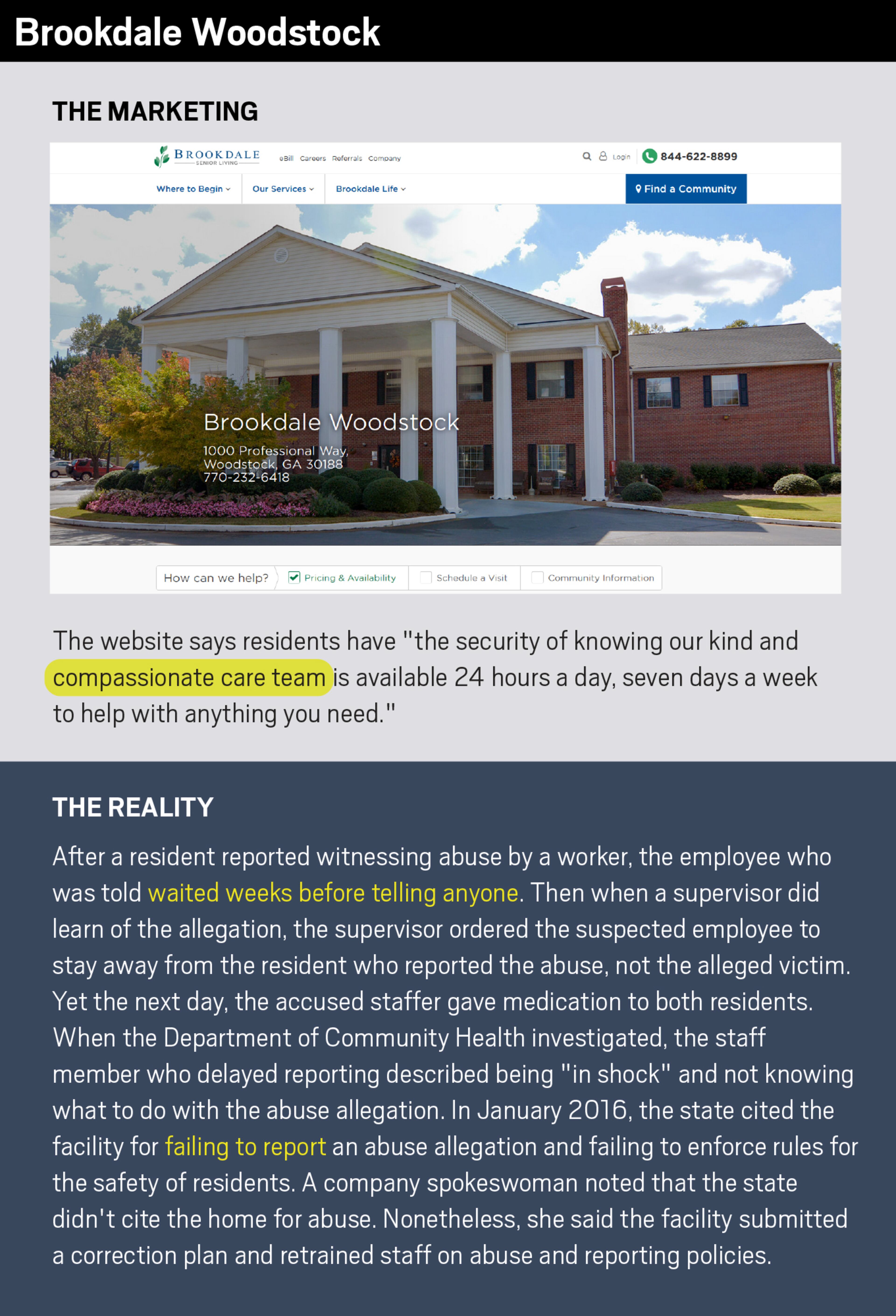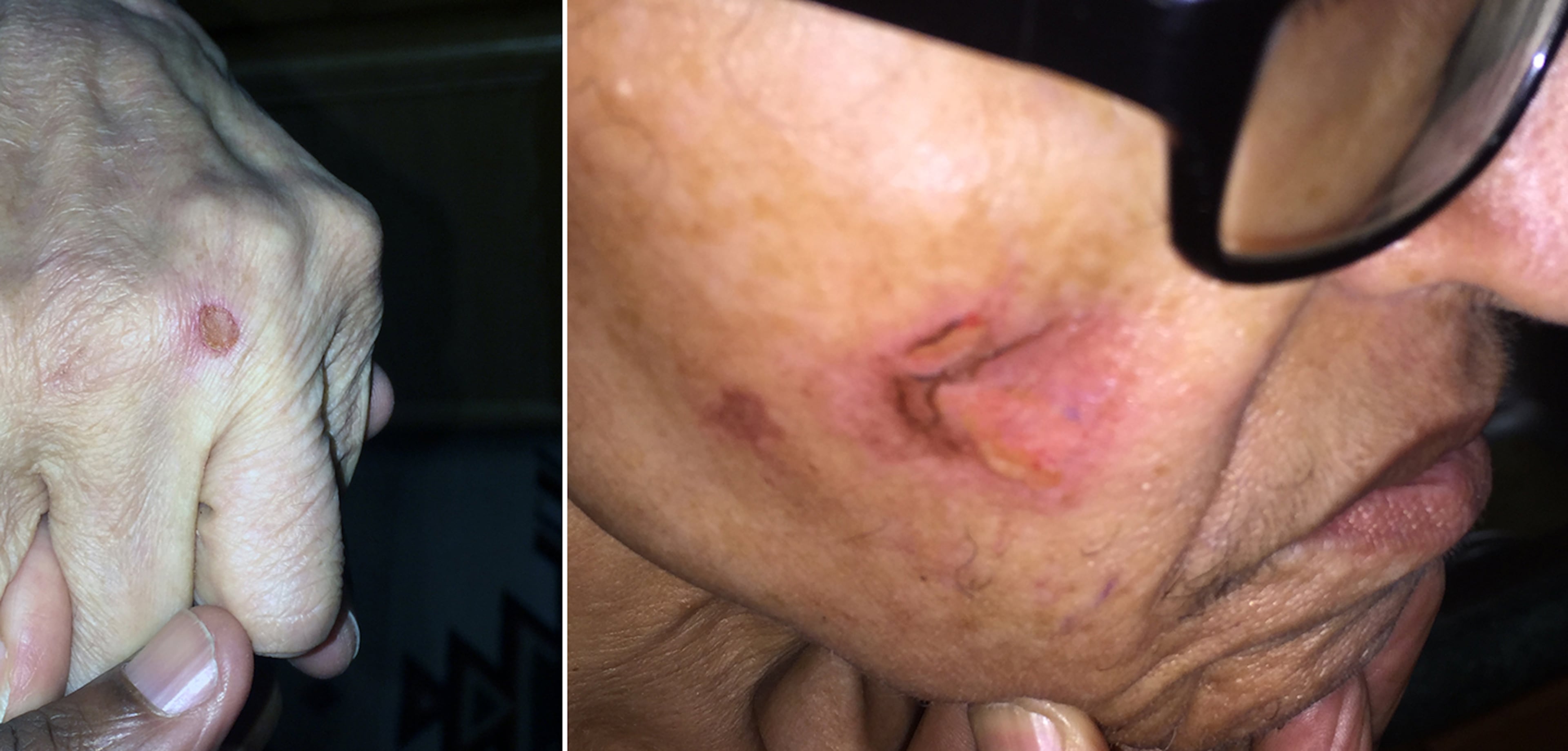Prosecutors not alerted to potential crimes

Suspicious deaths and allegations of mistreatment in senior care facilities can routinely go unreported to law enforcement and prosecutors, a breakdown that allows abusive or neglectful caregivers to escape punishment and continue to work around seniors, an Atlanta Journal-Constitution investigation found.
There’s no public record that police were notified in 40% of physical and sexual abuse allegations detailed in inspection reports by the Georgia Department of Community Health. Neglect was even less likely to be reported. Spot checks of law enforcement agencies showed that cases of neglect described in DCH reports, such as residents being left in filthy conditions or denied medical attention, were often unreported, even though intentional neglect of the elderly is a crime.
The AJC reviewed dozens of other cases across the state of residents with bruises and bloody accidents that the homes simply could not explain. All the cases were serious enough to catch the attention of state inspectors. But Georgia’s elder abuse system rarely got the chance to decide if these acts rose to the level of crimes because police were not called and prosecutors weren’t notified.
» SEARCHABLE DATABASE: Details on every home studied by the AJC
» MORE: The 'Unprotected' investigative series
That worries those who spend their days trying to protect older Georgians from abuse and neglect at senior care facilities.
DeKalb is considered one of the most aggressive counties in taking cases of elder abuse and neglect. Yet the prosecutor who oversees elder abuse cases in DeKalb said she couldn’t recall ever receiving a referral from DCH.
The AJC showed DeKalb Deputy Chief Assistant District Attorney Jeanne Canavan 11 cases where facilities in the county were cited by state regulators for allegations involving harm to seniors. None had been brought to the attention of her office for review.
» LISTEN BELOW: Carrie Teegardin discusses the "Unprotected" series on GPB's "On Second Thought"
“Some of these cases should have been criminally investigated,” Canavan said. “I’m not saying they would have resulted in charges. I would have liked to have gotten them when they were fresh.”
Police may not be flagging abuse and neglect reports for state inspectors or prosecutors to review, either. In five such cases reported to police in DeKalb, there was no corresponding report in public DCH records. Only one of those cases made it to Canavan for review, and it led to charges of elder abuse and neglect against a facility employee.

Other prosecutors also told the AJC it was rare for them to receive reports of cases of elder abuse and neglect at licensed senior care facilities.
“I don’t believe it’s because they don’t exist,” said Jason Marbutt, a Cobb senior assistant district attorney who chairs the county’s elder abuse task force. “I think it’s because we don’t know about them.”
DCH declined to be interviewed for this story. In written responses to questions, agency officials noted it’s the obligation of facilities, not the agency, to report suspected crimes. However, DCH wrote that it will report a case to law enforcement if it determines a facility failed to do so.
One of the issues that most troubles Canavan is if a death linked to possible neglect goes unreviewed by the DA’s office.
DCH told the AJC it doesn’t keep data on deaths in assisted living facilities and personal care homes. In analyzing the agency’s records since 2015, however, the AJC identified 20 deaths tied to violations that DCH found. Three deaths were at DeKalb facilities.
Canavan said she wasn’t aware of them until the AJC presented its list.
» MORE: Son searches for answers in mother’s alleged assault
» CONSUMER GUIDE: Resources for finding and evaluating a senior care facility
The three deaths occurred over the course of several months in 2016.
One of those who died was a resident at Sunrise of Decatur. The resident fell out of bed after an employee providing incontinence care left to get supplies, state records show. Over the next 12 days, at least three staff members reported that the resident, who was nonverbal, appeared to be shaking and grimacing in pain. Finally, the resident was hospitalized and diagnosed with a broken hip. Less than two weeks after going into the hospital, the resident died. DCH cited the assisted living home in an August 2016 report for failing to properly care for the resident.
That same month, a 90-year-old resident at Peregrine's Landing at Emory Heights fell from bed. Peregrine's told emergency personnel that the resident fell to the floor after climbing over a bedrail, state records show. But a hospital doctor expressed doubts about that account, saying the person's physical limitations made it unlikely he or she could have climbed over the bedrail, according to a state report. The resident, who had severe dementia and couldn't speak, died 17 days after the fall.
» READ INSTALLMENT 1: A beloved father, a night of betrayal
» READ INSTALLMENT 2: Suffering behind the facade
Around the same time, a 71-year-old fell at Mountain View personal care home near Decatur, records show. She suffered in pain for more than a week before she was transferred to a hospital and treated for a broken hip, records show. DCH cited the home for failing to provide proper care. She died three months after falling.
Sunrise and Mountain View officials declined to comment. Peregrine's Landing operates today under a new owner and a new name, The Madeline of Decatur. In a written statement, company officials said they are aware of "the tragic incident" that occurred under the previous management and have made it a priority to ensure the safety and care of their residents.
Gaps persist despite tougher law
Some reporting problems are rooted in a legacy of Georgia law, which until six years ago essentially didn’t acknowledge elder abuse, neglect and exploitation as crimes in nursing homes, assisted living and personal care facilities. That’s because residents of the homes were left out of the state’s criminal definition of elder abuse victims.
As a result, on the rare occasion a case got reported to prosecutors, their options for pursuing cases was limited.
"If you're talking about days, weeks, months before the prosecutor, the police get a report, then you're also pushing back that investigation." —Pete Skandalakis, executive director of the Prosecuting Attorneys' Council of Georgia
State lawmakers closed that gap in 2013 by expanding protections to residents in long-term care facilities through new laws which clearly spelled out that elder abuse and neglect in facilities are felony crimes. Other changes included toughening sentencing laws, expanding the list of those who are required to report suspected abuse of seniors, and specifying that those reports should be made both to law enforcement and DCH.
But the changes aren’t meaningful unless facility workers, regulators and police understand the law and use it in the field, and the AJC found weak compliance.
Despite the law, DCH had no public records detailing more than a dozen cases of suspected abuse the AJC found in examining police reports involving 76 facilities across the state over the past four years.

The AJC also found that few of those required to report suspected elder abuse, exploitation or neglect are held accountable, even though violating the law is a misdemeanor.
Managers and employees of long-term care facilities are among those legally required to report. Those reports are to be made immediately by phone or in person to DCH, then followed up by a written report within 24 hours. Yet police and DCH reports show some homes sometimes delayed reporting allegations for weeks.
Pete Skandalakis, executive director of the Prosecuting Attorneys’ Council of Georgia, said the sooner investigators get notified, the better chance they have of finding if a crime occurred.
“If you’re talking about days, weeks, months before the prosecutor, the police get a report, then you’re also pushing back that investigation,” Skandalakis said. “Witness memories fade. Information may be lost. Data may not be able to be collected.”

Pat King, a forensic nurse who is one of Georgia’s leading experts on elder abuse and neglect, said police officers, long-term care facility staff and others across the state need training on recognizing abuse. They also need to understand their reporting responsibilities, she said.
As head of a special unit in the Department of Human Services’ Aging Services division, she’s working to address the issue. So far, King and her unit have trained more than 3,500 front-line workers and police officers.
“If a street officer responds to a call and they don’t recognize [abuse and neglect], they’re never going to notify a detective,” she said.
The unit also is working with new local elder abuse teams to improve cooperation among law enforcement, prosecutors and social service agencies. The goal is to foster communication across a sprawling system.
“We’re trying to figure out gaps that exist and figure out ways to make it better,” King said.

‘Voice for the dead’
With a system that relies heavily on self-reporting, a broader issue is that abuse and neglect can be hidden. That’s especially a risk when some residents won’t remember what happened or won’t be believed.
Hapeville police investigated injuries to a woman with dementia only because her son, a teacher who was his mother’s primary caregiver, refused to accept the explanation he was given for her injuries.
An administrator at Hapeville Manor Senior Care initially told Travor Moore in early January that a red mark on his mother after she spent a week at the facility on respite care was a carpet burn, according to a lawsuit.
But his lawsuit contends that his mother’s caregiver, Britney Nichelle Thomas, used a lit cigarette to burn her face and other areas of her body. The lawsuit also says that the home had rehired Thomas after it had fired her for neglecting residents.

Court records show Thomas also had a conviction for aggravated assault and other offenses, a criminal record that should have disqualified her under state law from working at a senior care facility.
Even after the home notified police of the suspected abuse of 66-year-old Jacquelyn Stafford, the case almost didn’t make it to a detective. The Police Department didn’t actively investigate until months later, as the lawsuit was being filed. DCH has no mention of the alleged abuse in public inspection reports.
Because families often believe injuries or deaths are the natural consequence of aging, not deliberate acts, abuse and neglect also can go unrecognized, several experts said. The system is also geared to view deaths as the natural course of things, they said.
“To simply say, ‘This person was 89 and died in a facility; it must be natural causes,’ that’s not working, and it has to change,” said Canavan, the veteran DeKalb prosecutor.

King, the state’s elder abuse expert, said she’s working with Georgia’s coroners and medical examiners to increase training to ensure there’s more review in suspicious deaths.
“We’re trying to make an effort to put more eyes on more people,” she said.
A few states have adopted laws to ensure a more formal review when someone dies at a long-term care facility. Arkansas, for example, requires assisted living facilities and nursing homes to report all cases to local coroners for review. The law came about after a coroner uncovered a series of suspicious deaths at a nursing home, said Kevin Cleghorn, president of the Arkansas Coroner’s Association.
Cleghorn, who serves a county near Little Rock, said most coroners in Arkansas go to the scene to view the body and investigate. They look for bedsores, bruising or other signs of possible abuse or neglect. He believes this scrutiny is a check on the system and can offer peace of mind to families through an independent review.
“We are going to examine every death and make sure it is as it should be,” he said. “That decedent cannot speak for themselves. Someone has to be the voice for the dead.”


